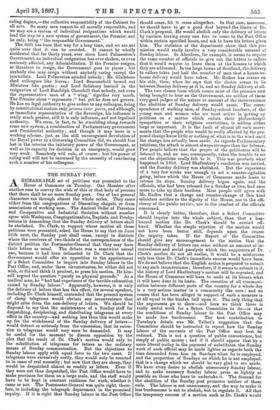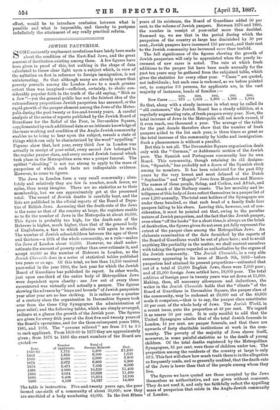THE SUNDAY POST.
AREMARKABLE set of petitions was presented to the House of Commons on Tuesday. One Member after another rose to convey the wish of this or that body of persons that there shall be no more Sunday post. One of two general characters ran through almost the whole series. They came either from the congregations of Dissenting chapels, or from associations of working men. The Ancient Order of Foresters and Co-operative and Industrial Societies without number agree with Weeleyans, Congregationalists, Baptists, and Presby- terians in demanding that the Sunday delivery of letters shall be abolished. Dr. Clark, to support whose motion all these petitions were presented, asked the House to say that on June 26th next, the Sunday post shall cease, except in districts where the receivers of two-thirds of the correspondence of the district petition the Postmaster-General that they may have their letters as usual. The debate was a somewhat unreal one, because it had been intimated to Dr. Clark that the Government would offer no opposition to the appointment of a Select Committee to inquire into Sunday labour in the Post Office, and, under these circumstances, he either did not wish, or did not think it prudent, to press his motion. He him- self argued the question "purely on physical grounds." As a medical man, he "had had experience of the terrible exhaustion caused by Sunday labour." Apparently, however, it is only the delivery of letters that has this effect, for several speakers, including Dr. Clark himself, contended that the present system of cheap telegrams would obviate any inconvenience that might arise from the non-delivery of letters. We should be disposed to say that the maintenance of a Sunday staff for despatching, deciphering, and distributing telegrams at every office in the country—and nothing less than this would make up for the withdrawal of the Sunday delivery of letters— would detract so seriously from the concession, that its exten- sion to telegrams would very soon be demanded. It may be useful for the moment to disarm opposition by the plea that the result of Dr. Clark's motion would only be the substitution of telegrams for letters as the ordinary means of Sunday communication. But the objections to Sunday labour apply with equal force to the two cases. If telegrams were excessively costly, they would only be resorted to in cases of real necessity; but now that they are cheap, they would be despatched almost as readily as letters. Even if they were not thus despatched, the Post Office would have to make provision for them on a large scale, and the staff would have to be kept in constant readiness for work, whether it came or not. The Postmaster-General was quite right, there- fore, in including the telegraph department in the promised inquiry. If it is right that Sunday labour in the Post Office should cease, let it cease altogether. In that case, moreover, we should have to go a good deal beyond the limits of Dr. Clark's proposal. Be would abolish only the delivery of letters by carriers, leaving every one free to come to the Post Office within certain specified hours, and ask to have his letters given him. The statistics of the department show that this per- mission would really involve a very considerable amount of Sunday labour. In Aberdeen, for example, it seems to require the same number of officials to give out the letters to callers that it would require to leave them at the houses to which they are addressed. In ten large towns of Scotland, the delivery to callers takes just half the number of men that a house-to- house delivery would have taken. Mr. Raikes has reason on his side, then, when he says that the choice seems to lie between Sunday delivery as it is, and no Sunday delivery at all.
The two classes from which comes most of the pressure now being brought to bear on the Government, are neither of them very good judges of the nature or amount of the inconvenience the abolition of Sunday delivery would cause. The corre- spondence of working men, of Sunday-school teachers, of the young men and women who are most active in getting up petitions on a matter which enlists their philanthropic sympathies or their religions convictions, is seldom either large or important. It is the fault of almost all such move- ments that the people who would be really affected by the pro- posed change know little or nothing of what is in the wind until the change has actually been made. As regards Parliamentary petitions, the attack is almost always stronger than the defence. Few people believe that the prayer of the petitioners will be listened to, and no one, consequently, takes the trouble to set out the objections really felt to it. This was precisely what happened in 1850. Lord Shaftesbury's resolution was carried, and the Sunday delivery was abolished. But the experience of a very few weeks was enough to set a counter-agitation going, before which the House of Commons made haste to retrace its steps. Sunday delivery began again, and the officials, who had been released for a Sunday or two, had once more to take up their burdens. Most people will agree with Mr. Raikes that a change and counter-change of this kind ministers neither to the dignity of the House, nor to the effi- ciency of the public service, nor to the comfort of the officials concerned.
It is clearly better, therefore, that a Select Committee should inquire into the whole subject, than that a hap- hazard motion like Dr. Clark's should be carried off- hand. Whether the simple rejection of the motion would not have been better still, depends upon the course the inquiry takes. If the Report of the Committee should give any encouragement to the notion that the Sunday delivery of letters can cease without an amount of in- convenience and social paralysis which the supporters of Dr. Clark's motion do not all realise, it would be a misfortune only less than Dr. Clark's immediate success would have been. We do not believe that the English nation is prepared to submit to any such inconvenience ; therefore, if it seems to submit to it, the history of Lord Shaftesbury's motion will be repeated, and the House of Commons will have to undo at its leisure what it will have done in its haste. The cessation of all communi- cation between different parts of the country for a whole day i8 a very serious matter in a community like ours ; and no reason that has been alleged in support of such a measure is at all equal to the burden laid upon it. The only thing that the arguments go to show—and here we think there is really useful work for a Select Committee to do—is that the conditions of Sunday labour in the Post Office may be made less burdensome. The best contribution to Tuesday's debate was Mr. Talbot's suggestion that the Committee should be instructed to report how the Sunday labour of the servants of the Poet Office may best be reduced. This is not a question of public convenience, but simply of public money ; and if it should appear that by a more liberal outlay in the payment of substitutes, the Sunday work of each official may be made lighter as regards both the time demanded from him on Sundays when he is employed, and the proportion of Sundays on which he is not employed, that is a change which we should be very glad to see made. We have every desire to abolish unnecessary Sunday labour, and to make necessary Sunday labour press as lightly as possible on those who have to undertake it. The demand for the abolition of the Sunday post promotes neither of these ends. The labour is not unnecessary, and the way to make it less burdensome is not to abolish, but to regulate it. All that the temporary success of a motion such as Dr. Clark's would
effect, would be to introduce confusion between what is possible and what is impossible, and thereby to postpone indefinitely the attainment of any really practical reform.



































 Previous page
Previous page